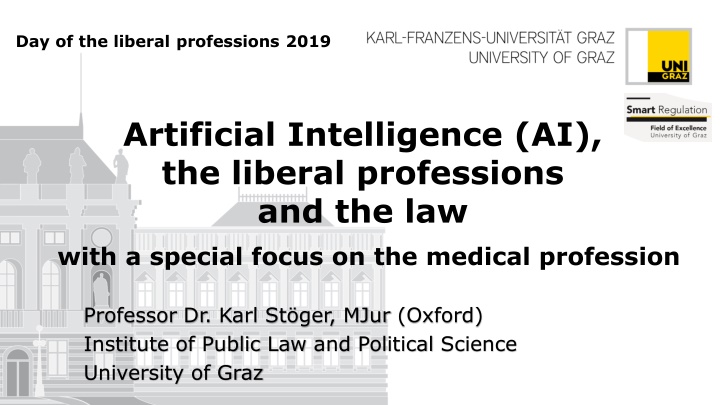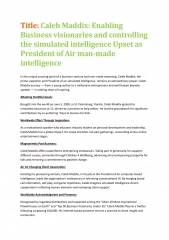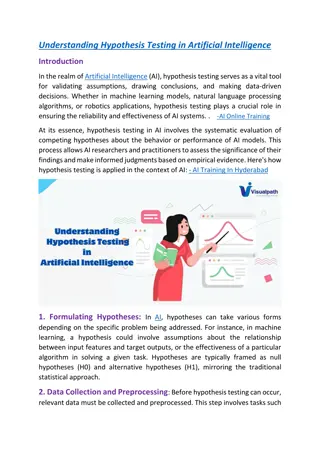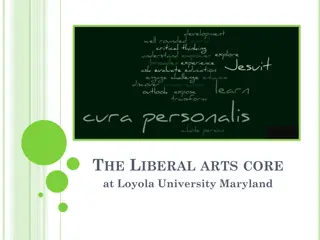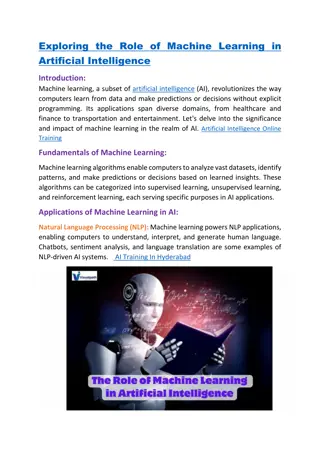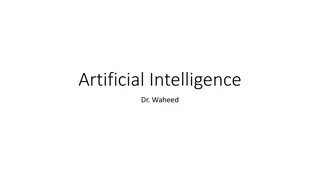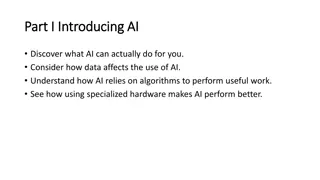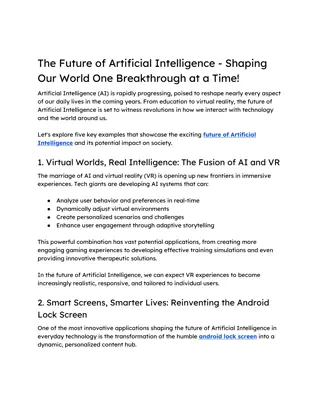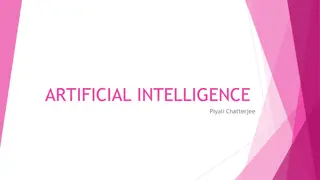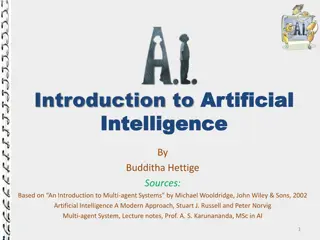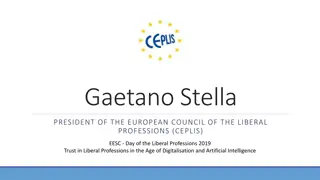The Impact of Artificial Intelligence on Liberal Professions in 2019
Discussing the influence of Artificial Intelligence (AI) on liberal professions, with a special emphasis on the medical field, as presented by Professor Dr. Karl St. ger. Exploring the definition of liberal professions, McCarthy's views on intelligence simulation by machines, the core aspects of Machine Learning, and the evolving state of AI applications in medicine, particularly in image evaluation and decision support. Highlighting how AI is reshaping job profiles in liberal professions.
Download Presentation

Please find below an Image/Link to download the presentation.
The content on the website is provided AS IS for your information and personal use only. It may not be sold, licensed, or shared on other websites without obtaining consent from the author.If you encounter any issues during the download, it is possible that the publisher has removed the file from their server.
You are allowed to download the files provided on this website for personal or commercial use, subject to the condition that they are used lawfully. All files are the property of their respective owners.
The content on the website is provided AS IS for your information and personal use only. It may not be sold, licensed, or shared on other websites without obtaining consent from the author.
E N D
Presentation Transcript
Day of the liberal professions 2019 Artificial Intelligence (AI), the liberal professions and the law with a special focus on the medical profession Professor Dr. Karl St ger, MJur (Oxford) Institute of Public Law and Political Science University of Graz
Definition of "liberal" professions "free" from the state, but also from third parties Performing an intellectual task due to special competence personally (predominantly in a special relationship of trust) self-reliant and professionally independent.
Definition of "liberal" professions "free" from the state, but also from third parties Performing an intellectual task due to special competence personally (predominantly in a special relationship of trust) self-reliant and professionally independent.
McCarthy: [] every aspect of learning or any other feature of intelligence can in principle be so precisely described that a machine can be made to simulate it. McCarthy: [ ] Jeder Aspekt des Lernens oder jedes andere Merkmal der Intelligenz kann im Prinzip so genau beschrieben werden, dass eine Maschine zur Simulation eingesetzt werden kann. Translated by DeepL Differentiation of AI, ML und DL (picture source: Singh, Cousins of AI <https://towardsdatascience.com/cousins-of-artificial- intelligence-dda4edc27b55>)
Core aspects of Machine Learning (ML) Recognition of patterns/rules in a large amount of data Transfer of these rules to unknown situations ML works with statistical tools a form of pattern recognition correlation instead of causality
State of development - medicine Image evaluation as a leading field of application for ML Decision support as the most promising market Lymph node biopsy, identification of a tumor (marked green) by means of AI (picture source: Google AI <https://ai.google/healthcare/>)
AI changes the job profiles of the liberal professions "Standard applications" for trainees will become less frequent (e.g. data checking) reduction of training positions? (Expenditure-based) fee calculation will have to adapt - but there will be new costs for AI infrastructure Partial replacement and further delegation of tasks: e.g. health apps, contract preparation on the Internet Potential dependency on a few providers
Who can regulate the use of AI? European law: if there is a reference to the internal market and thus a need for legal harmonisation: e.g. differences between national AI regulations make cross-border activities more burdensome International law (e.g. "European Ethical Charter on the use of AI in judicial systems and their environment" of the Council of Europe) National law Professional codes - self-regulation as a "privilege" of the liberal professions
Where does the European law stand? No comprehensive codification, only single provisions (e.g. Art 22 GDPR automated individual decision- making, including profiling) Awareness: given, implementation: work in progress High-Level Expert Group on AI: AI Definition, Ethics Guidelines (currently in practical pilot phase until early 2020), Policy and Investment Recommendations Announcement von der Leyen: legislative within 100 days proposals No specific rules for the liberal professions
High-Level Expert Group on AI: Ethics Guidelines 4 ethical principles: 1. Respect for human autonomy 2. Prevention of harm 3. Fairness 4. Explicability 7 core requirements: 1. Human agency and oversight 2. Technical robustness and safety 3. Privacy and Data Governance 4. Transparency 5. Diversity, non-discrimination and fairness 6. Societal and environmental wellbeing 7. Accountability (source: https://ec.europa.eu/futurium/en/ai- alliance-consultation/guidelines)
AI and human rights: Charter of Fundamental Rights, ECHR, constitutions Responsibility for the consequences of innovation: The state guarantees protection from negative effects of technological innovation Principle of non-discrimination Attention: correlation instead of causality Freedom of innovation: Securing the freedom for technical development - Freedom to conduct business, right to (intellectual) property Necessary standard of medical treatments: Obligation to use AI? (e.g. ECHR 30.8.2016, 40448/06 Aydo du/Turkey: functioning hospital system)
Quality of the database of AI-applications: European Union Agency for Fundamental Rights Source: FRA, Data quality and artificial intelligence mitigating bias and error to protect fundamental rights (2019)
Personal intellectual care as a core element of all liberal professions Mutual trust Blueprint of a black box in systems theory (picture source: Krauss, Blackbox3D <https://de.wikipedia.org/wiki/Black_Box_ (Systemtheorie)#/media/Datei:Blackbox3D.png> CC BY-SA 4.0) Explainable AI is an important topic, in particular for medical professionals in the area of informed consent Justification of decisions is particularly essential for members of the liberal professions as they work as advisors and companions
(picture source: Elliott, AI Cartoons <https://timoelliott.com/blog/cartoons/artificial-intelligence-cartoons>)
Personal and trustful provision of services (I) Protection of privacy of patients [ ] Black-box medicine the use of big data and sophisticated machine-learning techniques for health-care applications could be the future of personalized medicine. Black-box medicine promises to make it easier to diagnose rare diseases and conditions, identify the most promising treatments, and allocate scarce resources among different patients. But to succeed, it must overcome two separate, but related, problems: patient privacy and algorithmic accountability. [ ] Source: Ford/Price, Privacy and Accountability in Black-Box Medicine, Michigan Telecommunications and Technology Law Review 2016, 1 (1)
Personal and trustful provision of services (II) [ ] Privacy is a problem because researchers need access to huge amounts of patient health information to generate useful medical predictions. And accountability is a problem because black-box algorithms must be verified by outsiders to ensure they are accurate and unbiased, but this means giving outsiders access to this health information. [ ] Source: Ford/Price, Privacy and Accountability in Black-Box Medicine, Michigan Telecommunications and Technology Law Review 2016, 1 (1)
Professional independence: conflicts of interest Duty to declare potential conflicts of interest (duty of loyalty) Client/patient can search for alternatives However: Financial development of AI: hunger for more data To renounce AI-support because AI is to useful (e.g. diagnostic accuracy) Dominance of few providers prevents realistic alternatives and not altruistic motives shape the is not a viable alternative
Thank you for your attention! Professor Dr. Karl St ger, MJur (Oxford) Institute of Public Law and Political Science University of Graz
